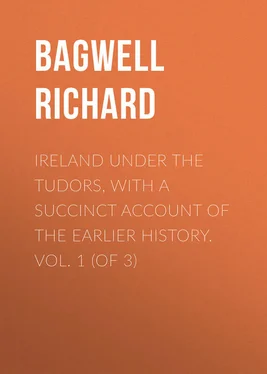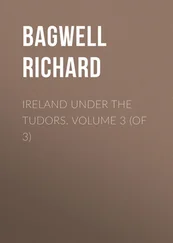Richard Bagwell - Ireland under the Tudors, with a Succinct Account of the Earlier History. Vol. 1 (of 3)
Здесь есть возможность читать онлайн «Richard Bagwell - Ireland under the Tudors, with a Succinct Account of the Earlier History. Vol. 1 (of 3)» — ознакомительный отрывок электронной книги совершенно бесплатно, а после прочтения отрывка купить полную версию. В некоторых случаях можно слушать аудио, скачать через торрент в формате fb2 и присутствует краткое содержание. Жанр: foreign_antique, foreign_prose, Историческая проза, на английском языке. Описание произведения, (предисловие) а так же отзывы посетителей доступны на портале библиотеки ЛибКат.
- Название:Ireland under the Tudors, with a Succinct Account of the Earlier History. Vol. 1 (of 3)
- Автор:
- Жанр:
- Год:неизвестен
- ISBN:нет данных
- Рейтинг книги:4 / 5. Голосов: 1
-
Избранное:Добавить в избранное
- Отзывы:
-
Ваша оценка:
- 80
- 1
- 2
- 3
- 4
- 5
Ireland under the Tudors, with a Succinct Account of the Earlier History. Vol. 1 (of 3): краткое содержание, описание и аннотация
Предлагаем к чтению аннотацию, описание, краткое содержание или предисловие (зависит от того, что написал сам автор книги «Ireland under the Tudors, with a Succinct Account of the Earlier History. Vol. 1 (of 3)»). Если вы не нашли необходимую информацию о книге — напишите в комментариях, мы постараемся отыскать её.
Ireland under the Tudors, with a Succinct Account of the Earlier History. Vol. 1 (of 3) — читать онлайн ознакомительный отрывок
Ниже представлен текст книги, разбитый по страницам. Система сохранения места последней прочитанной страницы, позволяет с удобством читать онлайн бесплатно книгу «Ireland under the Tudors, with a Succinct Account of the Earlier History. Vol. 1 (of 3)», без необходимости каждый раз заново искать на чём Вы остановились. Поставьте закладку, и сможете в любой момент перейти на страницу, на которой закончили чтение.
Интервал:
Закладка:
The rights and privileges of Holy Church were jealously guarded by the Parliament of Kilkenny. Persons excommunicated for infringing her franchises were to be imprisoned by the civil power until restitution was made. Tithes were specially protected, and the excommunicated were not to be countenanced by King or people. But the distinction between the hostile races was maintained in matters ecclesiastical. No Irishman was to be admitted by provision, collation, or presentation among the English. Such preferments were declared void, and the next presentation was to lapse to the Crown. Religious houses situated among the English were strictly forbidden to receive Irishmen, but Englishmen by birth and by blood were given equal rights. The Irish prelates present probably found no difficulty in accepting these principles, for they might, and did, retaliate by refusing to receive English clerks in Irish districts. The Archbishops and Bishops assembled at Kilkenny lent a special sanction to the statute by agreeing to excommunicate all who broke it, and they declared such offenders duly excommunicated in advance.
Sir John Davies, with less than his usual accuracy, has declared that ‘the execution of these laws, together with the presence of the King’s son, made a notable alteration in the state and manners of the people within the space of seven years, which was the term of this prince’s lieutenancy.’ Now, the Statute of Kilkenny was not passed till 1367, and Lionel died in 1368. The Act of Henry III., on which Davies chiefly founded his statement, says the land continued in prosperity and honour while the Kilkenny laws were executed, and fell to ruin and desolation upon their falling into abeyance. But the annalists tell a different story, and it is not easy to say what those fat years were. In 1370, only three years after the passing of the much vaunted statute, the Earl of Desmond and others were taken prisoners by the O’Briens and Macnamaras, and the deputy, Sir William de Windsor, was obliged to leave the O’Tooles unchastised in order to hurry to the defence of Munster. Newcastle, within a day’s ride from Dublin, was taken and dismantled. The judges could not get as far as Carlow. In 1377 the O’Farrells gained a great advantage over the English of Meath. The general result of the fighting during the ten years which followed the Parliament of Kilkenny was that the Irish retained possession of at least all which they had previously won. What the statute really did was to separate the two races more completely.
Edward III. repeated his grandfather’s mistake, and drew away many of the colonists to his Scotch and Continental wars. An Anglo-Irish contingent fought at Halidon Hill, and it was while making preparations for that campaign that the Earl of Ulster lost his life. Ireland was also well represented at Creçy, and many brave men fell victims to disease at Calais. The Viceroys sent over from time to time seem to have been regarded as licensed oppressors, and it is recorded of many that they left Dublin without paying their debts. Sir Thomas Rokeby, who was Deputy in 1349 and 1356, is praised by the contemporary chronicler Pembridge for beating the Irish well, and for paying his way honestly. ‘I will,’ he said, ‘use wooden cups and platters, but give gold and silver for my food and clothes, and for the men in my pay.’ That this golden saying, as Davies calls it, should have been thought worth recording shows what the general practice was. The three great pestilences which ravaged England ran their course in Ireland also. It was to the first of these visitations that the annalist Clyn succumbed. ‘I have,’ he records, ‘well weighed what I have written, as befits a man who dwells among the dead in daily expectation of death; and lest the writer should perish with the writing, and the work with the workman, I leave parchment for a continuation, if by chance any of the race of Adam should escape this plague and resume my unfinished task.’ On the whole, the reign of Edward III. must be regarded as one of the most disastrous in the annals of the English in Ireland.
The reign of Richard II. is mainly remarkable for the King’s two visits to Ireland. But that step was not taken until many others had failed. James Butler, third Earl of Ormonde, was Viceroy when the old King died. He continued in office, and held a Parliament at Castle Dermot, whose deliberations were interrupted by an invasion of Leinster on the western side. The O’Briens were bought off with 100 marks, but there were only nine in the treasury, and the residue was supplied by individuals who gave horses, a bed, or moderate sums of money. Ormonde resigned an office which there was no means of supporting properly, and the Earl of Kildare refused the post. In 1380 Edmund Mortimer, Earl of March, who claimed Ulster through his wife Philippa, the daughter of Duke Lionel, agreed to accept the burden for three years. He covenanted for 20,000 marks and for absolute control over the revenue of Ireland. The Irish scarcely ventured to oppose him openly; and he recovered Athlone, built a bridge at Coleraine, put down rebels in southern Leinster, and might have extended his power still further had he not died of a chill, caught in fording a river near Cork. Ormonde and Desmond refused to accept the vacant government, and the Irish continued to enlarge their borders. In 1385 Robert de Vere, Earl of Oxford, the King’s favourite and grandson of Ralph d’Ufford and the Countess of Ulster, was appointed Viceroy for life, and created first Marquis of Dublin, and then Duke of Ireland. All the attributes of royalty, such as the right to coin money and issue writs in his own name, were conferred on him, and he undertook to pay the King 5,000 marks a year, which the latter agreed to remit until the conquest of Ireland was complete. De Vere did not visit Ireland; but the government was carried on in his name for some years, during which the colony grew weaker and weaker. Nor did his disgrace make any more difference than his appointment had done. Limerick and Cork could scarcely defend themselves. Waterford was harassed by the Le Poers and their Irish allies. Towns in Kildare were burned, and the English Bishop of Leighlin was unable to approach his diocese. Galway threw off its allegiance, and sought the protection of MacWilliam. In 1391 the Earl of Ormonde was again persuaded to undertake the government with a salary of 3,000 marks; but he could do little more than temporise. Payments to the Irish were frequent, and as they constantly advanced the dispossessed settlers carried the story of their woes to England. Proclamations against absentees were of small effect, and at last the King determined to go himself. He landed at Waterford on October 2, 1394, with 4,000 men at arms and 30,000 archers. As soon as Art MacMurrough, whom the Leinster Irish accepted as their king, heard of Richard’s arrival, he attacked New Ross, ‘burned its houses and castles, and carried away gold, silver, and hostages.’
Richard II.’s army, augmented as it was by the forces of the colony, was the largest seen in Ireland during the middle ages, and has hardly been exceeded in modern times. William III. had about 36,000 at the Boyne. Nothing was performed worthy of so great a host or of the King’s presence. One division of the royal army was defeated with great loss by the O’Connors of Offaly, and another by the O’Carrolls. Richard saw that his troops were unfit for war in bogs and mountains, and could not but confess that the natives had many just causes of complaint. He adopted a conciliatory policy, and induced O’Neill, O’Connor, MacMurrough, and O’Brien, as representatives of the four royal Irish races, to do homage and to receive the honour of knighthood at his hands. These four, and a great number of other chiefs, bound themselves to the King by indenture; but no money was actually paid, and for all practical purposes Caligula’s shells were quite as good a badge of conquest. The German princes had a right to say that Richard was not fit for empire, since he had been unable to subdue his rebellious subjects of Ireland. He remained nine months in the island, and left the government to Roger Mortimer, Earl of March, heir-presumptive to the Crown, and claiming to be Earl of Ulster in right of his mother, the only child of Lionel, Duke of Clarence.
Читать дальшеИнтервал:
Закладка:
Похожие книги на «Ireland under the Tudors, with a Succinct Account of the Earlier History. Vol. 1 (of 3)»
Представляем Вашему вниманию похожие книги на «Ireland under the Tudors, with a Succinct Account of the Earlier History. Vol. 1 (of 3)» списком для выбора. Мы отобрали схожую по названию и смыслу литературу в надежде предоставить читателям больше вариантов отыскать новые, интересные, ещё непрочитанные произведения.
Обсуждение, отзывы о книге «Ireland under the Tudors, with a Succinct Account of the Earlier History. Vol. 1 (of 3)» и просто собственные мнения читателей. Оставьте ваши комментарии, напишите, что Вы думаете о произведении, его смысле или главных героях. Укажите что конкретно понравилось, а что нет, и почему Вы так считаете.












